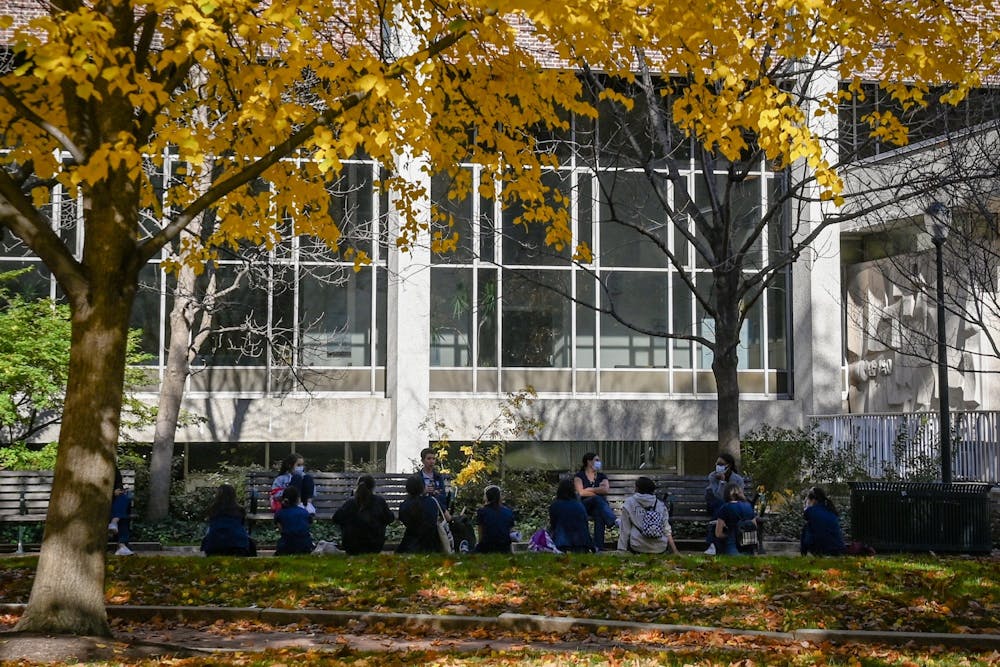Penn's new block schedule format set to debut in fall 2021 — which will standardize course start times and ensure at least 15 minutes between each class — will not require professors to teach for the 10 extra minutes in place of the currently observed passing time, administrators told The Daily Pennsylvanian.
Several faculty members, however, reported unclear communication from administrators about whether they would be required to teach for extra time, and if so, whether they would be compensated. More than 150 faculty members signed a petition led by Penn's American Association of University Professors chapter objecting to the schedule change on the grounds that faculty members were not properly consulted, an increase in teaching time would increase the amount of work required of faculty without compensation, and professors who have the highest course loads would be disproportionately impacted.
"The apparent elimination of the existing 10 minutes of 'passing time' built into our current course blocks makes this schedule change amount to a tacit addition of 10 minutes of teaching per class period," the petition states. "When faculty have asked whether the modified schedule indeed extends teaching time, administrators have not provided a decisive answer."
Associate Vice Provost of Education and Academic Planning Gary Purpura told the DP on April 7 that, although he is familiar with the petition, the new schedule format will not make any explicit changes to class end times. He said, however, that since the 10 minutes are no longer necessary for travel time, an instructor who wishes to teach for an additional 10 minutes will have the freedom to do so.
“The idea of the new block schedule is really about the start times of courses, and it’s not really about the end times,” Purpura said. “Faculty who were teaching three times a week in a 60-minute time block — if they were doing 50 minutes, 55 minutes, 45 minutes, we never would police that before, and we’re not going to police that now.”
Earlier this year, Penn introduced plans for the new block schedule, under which classes will start at one of eight designated start times beginning at 8:30 a.m. and ending at 8:30 p.m., with the latest classes ending at 10 p.m.
The new format will ensure at least 15 minutes between course meetings. Currently, it is University policy that classes end 10 minutes before the scheduled ending time to allow travel time for students taking back-to-back classes.
Students previously expressed mixed feelings about the new schedule to the DP, with some praising the decision to extend passing time between classes, and others saying they will miss the ability to schedule classes back-to-back.
RELATED:
Professors say some pandemic-induced changes to teaching styles are here to stay
Professors report unexpected benefits of virtual education despite facing challenges
Several faculty members reported a lack of communication from administrators about the details of the block schedule after its announcement, prompting some faculty members to believe that the schedule would entail a universal 10-minute increase to class times.
“There has been no communication. There’s been the announcement of this class scheduling grid, and after that, there hasn’t been very much at all,” English professor and AAUP-Penn President Suvir Kaul said.
AAUP is a membership-based national professional organization that seeks to advance shared university governance and academic freedom, define professional values and standards, and promote economic security for university faculty members. Penn faculty members organized an AAUP-Penn chapter earlier this spring.
Purpura said that, while communication from administration can always be improved, he and others in the provost’s office have communicated with deans and professors about details of the new block schedule. He added that he is willing to speak with faculty members who are confused or concerned about the new schedule's format.
Kaul and Russian and East European Studies professor and Department Chair Mitchell Orenstein, however, said that undergraduate deans were unable to provide clarity on the issue. Orenstein added that “at [the School of Arts and Sciences], they communicated pretty clearly that they had also been asking for what’s going on, and they hadn’t gotten a real, definitive answer.”
AAUP-Penn leaders said they were concerned that a potential 10-minute increase to class meetings would have a disproportionate impact on lecturers and non-tenured faculty members who teach large course loads and might not have sufficient job security to pressure administrators for answers.
“It’s especially common among language instructors, for instance, to teach three language courses in a given semester, and because language courses meet more frequently, someone who is teaching language might be teaching three courses that meet five times a week,” English professor and AAUP-Penn Communications Secretary Emily Steinlight said. “And so if you add 10 minutes to each of those sessions, a faculty member is now teaching 35 extra hours total over the course of a semester, and that would seem to be without any additional pay.”
Orenstein said he does not think that an increase in class time would greatly impact his teaching work, but added that it could impact language instructors in his department.
A foreign language lecturer who requested anonymity for fear of retaliation, who teaches five courses per academic year, echoed Steinlight's sentiment. The lecturer said that a mandated 10-minute increase to course times would add an hour of teaching per week to their current workload.
“As non-tenured faculty, we are much more vulnerable and more affected by that change as well, just because of our different course load,” the lecturer said.
Kaul emphasized that while a tenured professor may be comfortable ignoring directions from administration, a non-tenured instructor may feel pressured to teach for the full 60 minutes of a class period.
“AAUP-Penn is much more concerned about the impact on non-standing faculty,” Steinlight said. “Those faculty don’t have job security in the way that tenured and tenure-track faculty typically do, and have less ability to speak out and to get clarification on some of these issues that tend to affect them disproportionately.”









